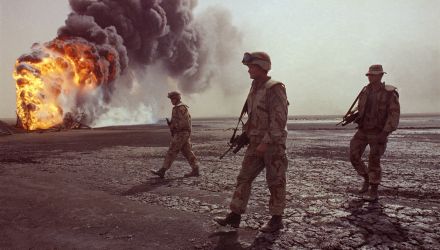BEIRUT -- Syria is the most dramatic moment of the Middle East today, as we await an American military strike against the ruling Assad regime -- but it is not the most consequential political development in the region today. That honor would have to go to the current attempt by the interim Egyptian government to ban the Muslim Brotherhood organization and its political party.
I say this for two reasons, related to Syria and Egypt. The first is that an American attack on Syria would be normal operating procedure in light of the last century of Western powers’ frequent military forays into the Middle East, usually to whack Arab or Iranian powers that were becoming too strong and independent-minded for the likes of the United States, UK, Israel or others. So one more Western power attack against one more Arab military dictatorship would merely confirm and perpetuate a legacy or Western militarism in the Middle East that we have lived with for over a century.
Egypt also matters more than Syria because developments there represent a dramatic new shift in how indigenous forces of power, identity and governance interact with one another. The two most powerful forces in society -- the military and the Muslim Brothers -- face off in a direct battle at a seminal moment in modern Arab history when indigenous populations seek to reconfigure their governance and state systems and write constitutions that truly reflect national values.
The confrontation between the armed forces and the Muslim Brothers reflects a much older tension in the Middle East that can be traced back to the early days of Islam over 14 centuries ago, and even further back to the dawn of urban society in the Bronze Age: How do citizens define the balance between the authority of the religious leadership and the role of secular governors who deliver basic services to the citizenry?
Legitimacy of authority among religious and civic figures to ensure societal well-being and public order has always been hotly debated and contested in Arab, Persian, Turkish and Asian Islamic societies. Towering forces such as Shari’a law, the Caliphate, the ‘ulama, the armed forces, the civil service, and the business and civic elites continue to compete for primacy in ensuring the wellbeing of the community, i.e., in governing.
For more background on this issue I strongly recommend a splendid new book that reviews the many legacies and controversies of “statecraft” in Islamic traditions, Mirror for the Muslim Prince: Islam and the theory of statecraft, edited by Mehrzad Boroujerdi (Syracuse University Press, 2013). Boroujerdi notes that “there is no unitary ‘Islamic’ position on important issues of statecraft and governance…. Islam is a discursive site marked by silences, agreements, and animated controversies (not to mention denunciation and persecutions).”
And so, here we are in 2013, with new controversies, denunciations and persecutions in Islamic realms, as assorted Islamists square off against each other, the armed forces, secular nationalists and other political groups to determine who governs the state and who shapes the national, civil, social and religious nature of the state as defined in the constitution. The latest development in Egypt sees the armed forces and allied civil groups that removed the Muslim Brotherhood’s Mohammad Morsi from the elected presidency now seek to ban the Muslim Brotherhood completely, both as a political party and a social non-governmental organization. This week a panel of Egyptian judges recommended the complete dissolution of the Muslim Brotherhood, following the last month of the government’s jailing hundreds of Brotherhood members after killing other hundreds during street demonstrations, and now putting Morsi and 14 other brotherhood leaders on trial for inciting violence.
The Muslim Brotherhood will soon redefine its strategy for engagement in public life. What is certain beyond any doubt is that it will remain as a potent force in society and political-public life, precisely because of the trends we witness across the Arab world, including Syria, that make people turn to religion when the state fails them. These trends include police state Arab regimes that will destroy their own countries in order to remain in power, regular foreign military assaults against Arab lands, and massive economic stagnation and poverty across the region. The continued hemorrhaging of Syria, where two million refugees abroad and another four million internally displaced, means that fully one-third of the population has seen their lives shattered. Not surprisingly, Islamist groups of various kinds have suddenly mushroomed across Syria, to fill the void left by the retreating state.
When the state and its armed forces try to outlaw religious elements in public life at the social-community or national-political levels, we can expect a robust clash between the two greatest forces that have contested public authority, national identity, and civil order in the Middle East for roughly the past 5000 years -- deities and defense ministers. The outcome of this battle will be remembered long after Barack Obama and Bashar Assad have left the scene.
Rami G. Khouri is Editor-at-large of The Daily Star, and Director of the Issam Fares Institute for Public Policy and International Affairs at the American University of Beirut, in Beirut, Lebanon. You can follow him @ramikhouri.
Khouri, Rami. “Deities and Defense Ministers.” Agence Global, September 4, 2013





